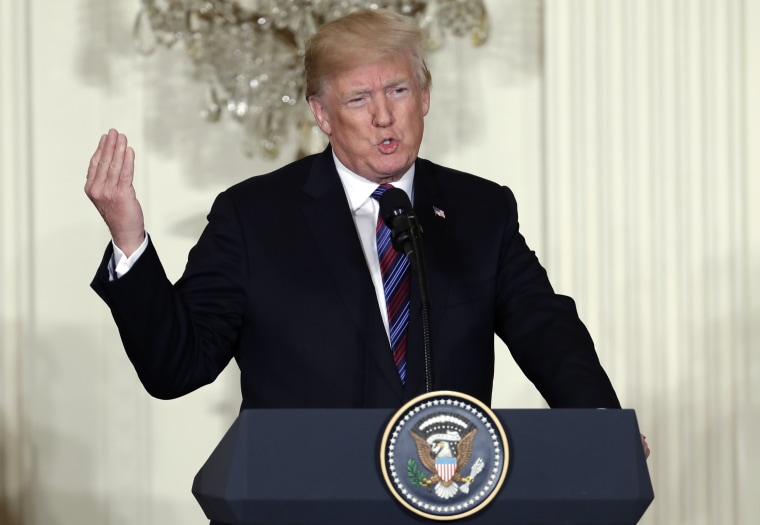WASHINGTON — President Donald Trump said Thursday that he is weighing an additional $100 billion in tariffs on China, raising the stakes in a potential trade war his top aides have tried to downplay.
The president ordered the U.S. Trade Representative (USTR) to explore the new trade penalties, beyond the $50 billion in U.S. tariffs on Chinese imports the White House announced Tuesday. China earlier this week announced $50 billion in tariffs on American goods.
"Rather than remedy its misconduct, China has chosen to harm our farmers and manufacturers. In light of China's unfair retaliation, I have instructed the USTR to consider whether $100 billion of additional tariffs would be appropriate ... and, if so, to identify the products upon which to impose such tariffs," the president said in a statement released Thursday evening.
"I have also instructed the Secretary of Agriculture, with the support of other members of my Cabinet, to use his broad authority to implement a plan to protect our farmers and agricultural interests."
In Beijing, the Commerce Ministry said China doesn’t want a trade war — but isn’t afraid to fight one.
“China will dedicate itself to the end and at any cost and will definitely fight back firmly” if the U.S. persists in its “protectionism,” the ministry said in a statement.
Larry Kudlow, the new director of Trump's National Economic Council, said on Wednesday that "it's possible" Trump's proposed tariffs against China could just be a negotiating tactic.
"It’s part of the process,” Kudlow told reporters, though he cautioned, "I would take the president seriously on this tariff issue.”
Earlier Thursday, at a roundtable on tax reforms in West Virginia, Trump had touched upon the subject, calling China's President Xi Jinping "a friend of mine, and I'm a friend of his." But he hammered Beijing, saying "we can't be taken advantage of any longer."
"We can't continue to allow this to happen, where hundreds of billions of dollars is taken out of our country and our system," he said. "If they make a car, they sell it here, it's 2.5 percent tax. If we make a car and try and get it into China, number one, they won't take it. But if they did, it's 25 percent tax."
Last month, U.S. allies were blindsided by Trump’s pledge to slap stiff tariffs on steel and aluminum imports. From Washington to Beijing, foreign officials have warned that any such measures by the Trump administration could be met with retaliation.
Thursday's announcement was met with an uproar, even by members of Trump's own Republican Party, who have warned it could trigger a backlash.
"Hopefully the President is just blowing off steam again but, if he's even half-serious, this is nuts," Sen. Ben Sasse, R-Neb., said in a statement. "China is guilty of many things, but the president has no actual plan to win right now. He’s threatening to light American agriculture on fire."
Trump has insisted that he is not looking to start a trade war, although he has also suggested that they are good for the U.S. economy.
On Wednesday, the president tweeted: "We are not in a trade war with China, that war was lost many years ago by the foolish, or incompetent, people who represented the U.S. Now we have a Trade Deficit of $500 Billion a year, with Intellectual Property Theft of another $300 Billion. We cannot let this continue!"
Trade with China is politically sensitive, as the world's second-largest economy runs surpluses against many of its trading partners. Since his campaign, Trump has signaled that he intended to take a tougher stance on China's trade practices.
China's 2017 trade surplus with the U.S. was a record-breaking $275.81 billion, the country's customs data shows. Overall, China's trade balance for 2017 was a surplus of $422.5 billion.
Last week, the president scored his first major trade deal, finalizing an agreement with South Korea that represents the type of unilateral pact Trump says makes the best sense for American companies and workers.
Trump's tariff threats extend well beyond China. He has repeatedly criticized multilateral trade deals with European Union allies and has touted his interest in negotiating better deals for the U.S.
"If you look at the European Union, it's very solidly against us in terms of trade," Trump said Thursday. "It's very unfair."
